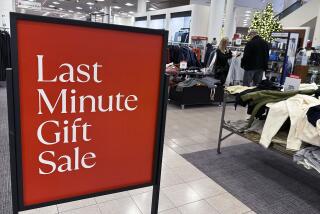A leaner Lunar New Year
- Share via
BEIJING — Painter Wei Haibin is carefully weighing every purchase as he heads home to Hebei province for China’s biggest family holiday -- a time when the economy typically enjoys a bounce.
“The total that I spend buying things for the Lunar New Year will be about half of what I spent last year,” he said.
“Though I will probably spend the same amount buying gifts for family and friends in my hometown because it’s a matter of face, I will be really tight on the things I buy for myself.”
Wei’s income from his landscape paintings, which are sold in Europe, fell 80% last year, and the Year of the Ox seems likely to bring more belt-tightening. Squeezed by the global slowdown, consumers and companies in countries that celebrate the Lunar New Year, which begins this year on Monday, are slashing their spending on traditionally lavish gifts, liquor and banquets.
In China, where many businesses count on the equivalent of a Christmas shopping boom for a big share of annual sales, the blow will hurt. It could further depress China’s falling growth rate just as Beijing is rolling out a multibillion-dollar plan to boost consumer spending.
“We would estimate spending would be off 20% to 30% this year, which is rather critical for quite a large number of retailers and certainly restaurants,” said Sam Mulligan, director of market research firm Data-Driven Marketing Asia, which surveyed 4,500 consumers in five major cities in December. “All of these areas are going to be hit hard.”
Mulligan said 35% of all Chinese entertainment spending and 40% of sales of premium beer and liquor take place over the weeklong Lunar New Year holiday.
At the International Exhibition Hotel in Dongguan, a manufacturing city in China’s south that has been battered by the drop in exports, companies that splurged on lobster for employee parties in 2008 are ordering pork this year. A hotel saleswoman said bookings of banquet rooms were still above 90%, but companies were spending about half as much per table this year, about 2,000 yuan ($290).
Companies also are scaling down employee lotteries -- a common feature of holiday parties.
“Prizes used to be cash -- thousands of yuan [hundreds of dollars] for the top prize -- or MP3 players, mobile phones or computers,” said Nancy Zheng, a saleswoman for the Sofitel Royal Lagoon Hotel in Dongguan. “This year, most prizes are blankets, quilts and microwave ovens.”
Independent economists expect China’s growth rate to fall this year as low as 5%, down from an estimated 9% last year and 13% in 2007.
The symbolism of the Year of the Ox -- an animal that stands for calm, hard work and risk-aversion -- is well suited to China’s struggle to revive its economy. By contrast, the Rat, whose year is now ending, is said to be charming and clever but cunning and selfish.
Hardest hit have been areas that depend on exports, which fell 2.8% in December compared with 2007 -- a painful decline from double-digit growth earlier in 2008.
Thousands of factories in the southeast that made toys, shoes and other goods for export have closed, and the now-jobless migrants they employed have returned to their villages without annual bonuses to pay for New Year gifts and festivities. Although many gifts are modest -- oranges, chocolate or liquor -- failure to bring them home could be a source of shame, and especially painful for parents who work away from home most of the year.
Other companies are expected to cut or withhold bonuses to preserve cash so they can outlast the slump. In a bid to hit sales targets before the economy declines further, one liquor producer has told distributors they must sell 25% of their 2009 quota in January alone or risk losing their franchises, Mulligan said.
“If they are doing that, they don’t have an awful lot of confidence in how the rest of the year is going to look,” he said.
Some companies, such as the video-sharing website Tudou.com, say they plan to pay bonuses, throw parties and give gifts as usual. Tudou will fly employees to Shanghai for an annual gathering, spokeswoman You Hanghua said.
“We don’t have big changes in spending this year compared with last year,” You said.
Foreign companies are cutting back, even those doing well in China such as Germany’s Daimler, which saw sales of its Mercedes cars here rise 44% last year. Daimler debated whether to have an employee party and decided to hold one at a less expensive venue than in 2008 and spend less on food and drinks, spokesman Trevor Hale said.
“It sends a message that, on the one hand it’s a tradition, especially for our Chinese colleagues, and is important to everyone, but at the same time we want to be frugal and send the message that we have to take care of business,” he said.
The downturn has cut into sales of the ubiquitous red envelopes, or hongbao, in which Chinese traditionally enclose cash gifts for relatives and business contacts -- and sometimes bribes for officials.
Bonnie Chan, chief executive of Hong Kong printing company Icicle, said sales of hongbao, calendars and other holiday items were down 35% as commercial firms cut back.
“They said, ‘This year, we don’t have the marketing budget,’ ” Chan said.
“They want to cut down on costs so this is a quite obvious thing to cut.”
Last year, Hong Kong brokerage Ample Financial Group splurged on a $1,500 trip for its six employees to the gambling enclave of Macao, said Alex Wong, an asset manager for the firm. This year, with bonuses cut 60%, the company will mark the holiday with a dinner.
“We are feeling that the worse is yet to come,” Wong said. “So this is not a time to celebrate. It’s a time to stay alert.”
The drop in holiday spending is clear from Taiwan to Singapore. In Taipei, Taiwan’s capital, cleaner Wu Jen-ai was buying sausages but said the gloomy economy was forcing her to cut back.
“In the past I used to buy a lot more when I shopped for New Year food,” said Wu, 58.
Singapore’s DBS Group Holdings Ltd., Southeast Asia’s largest bank that announced Nov. 7 that it would cut 900 jobs, or 6% of its workforce, will have a dinner for key clients and hand out red envelopes to customers but will scale back decorations in its branches, spokeswoman Karen Ngui said.
“With the economy the way it is, the prudent thing to do is to celebrate the festivities on a more pragmatic basis,” Ngui said.
In Vietnam, consumers are rethinking what to buy for the holiday known locally as Tet. Many companies have cut bonuses, said Dang Quang Dieu, an official of the Vietnam Labor Confederation, the country’s government-sanctioned union.
“I have to cut spending for this Tet,” said Nguyen Thanh Hoa, 45, an accountant for an electrical engineering company in Hanoi, the capital. “I’m worried that this year will be more difficult. I have to start saving money now.”
More to Read
Inside the business of entertainment
The Wide Shot brings you news, analysis and insights on everything from streaming wars to production — and what it all means for the future.
You may occasionally receive promotional content from the Los Angeles Times.










